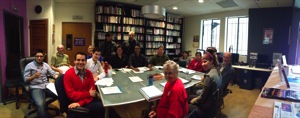
Consider this. According to Wikipedia there are approximately 60,000 LGBT people living in metropolitan San Diego. Taken at face value that means there are upward of 60,000 gay people using their smart phones and/or point and shoot cameras all day long, taking snapshots of partners and events and fleeting moments that are here today, then gone tomorrow. Multiply that out and imagine thousands and thousands of hard drives full of images illustrating the humdrum substance of our lives: selfies and rallies, parties and Prides, pet pics and x pics.
Now imagine all the emails and text messages sent from one queer person to another, each and every moment, day after day, each Tweet packed with a vernacular of LOLs and other au courant abbreviations that mean something in 2013 but perhaps nothing in the 22nd century. Imagine all the documents that are being generated. Consider all the LGBT businesses and media outlets, all the bars and clubs, all the flyers and brochures and T-shirts and buttons and posters and banners. We are a creative bunch so think about all the art that is being created, all the paintings, all the video, all the elaborate costumes. Chris Kehoe, Toni Atkins, Todd Gloria, Carl DeMaio. As more representatives of our community achieve higher office think about all the statistics, the voting records, the speeches, the proclamations, all the historical artifacts.
Imagine how much stuff that is. What will happen to it all, all the stuff that describes and defines a very particular lesbian, gay, bisexual and transgender community that equals San Diego’s here, now and yesterday.
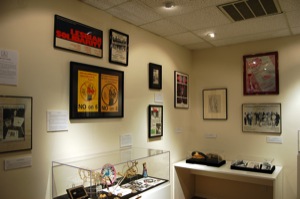
That’s a lot of information. It’s a lot of material that for now we might think of as junk, recycling, mostly meaningless. We’ll all play our part preserving vital bits and pieces of it and casually or consciously throwing a whole lot of it out. This very newsmagazine that you are holding might end up in a land fill a few weeks from now. Or, if you are looking at these words on a screen this page of text will become buried beneath a timeline of Internet infinity, searchable, but quite possibly unseen forever.
Or, maybe not. This newsprint document could survive decades, a century even, and end up in a hermetically sealed box stacked in a climate controlled room that only scholars will see. Alternatively, this hyperlink might be organized into a hard drive of data that will help future students know more about our local LGBT history.
Enter Lambda Archives San Diego (formerly the Lesbian and Gay Archives of San Diego, later the Lesbian and Gay Historical Society of San Diego), a small non-profit organization which I suspect every one of you has engaged with ever so casually at one point or another since it was established back in 1987.
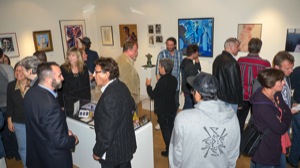
Lambda is bracing for a day when they begin collecting towers and towers of electronic data, but for now they are sorting and storing – preserving – those very important documents of the very important (for the gay community) 20th century. If you visit their charming, sleek space in University Heights (tucked behind Diversionary Theatre) you will find art on the walls, photographs in old albums, paper documents, VHS tapes, floppy disks, books and lots and lots of T-shirts, all of it charting our local LGBT community’s past!
Along with museums and libraries archives are a community’s memory bank. Large or small, archives are repositories of a history, a history understood via the detritus of today that people in the present might not anticipate or even acknowledge as valuable. An archive can be anything from a scrapbook stashed in your closet to the Smithsonian Institute. Archives can be a record of a country or a community or a family. And so Lambda Archives is the memory bank for our town. It’s a wonderful, very organized-looking space, but it began in a home that from what I learned looked something like an episode of Hoarders.
Back in 1987 Jess Jessop and Doug Moore had the foresight to start keeping things, collecting and storing flyers and posters and other bits and pieces that marked the evolution of gay liberation as it played out here in this city. Bits and pieces of paper became boxes of literature and artifacts. Before too long people learned about the fledgling archive (repository of important stuff) and started donating their belongings, in case it might have some importance to someone, one day. With so much death in the 1980s and 1990s there was so much to hang on to, eventually sort through and now more recently, donate.
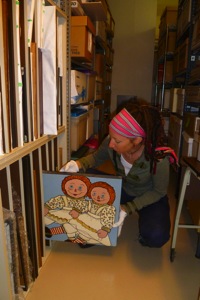
And so Lambda Archives grew and continues to grow. It’s mission is to collect, preserve, and teach the history of lesbian, gay, bisexual, and transgender people in the San Diego and Northern Baja California region.
The non-profit has crossed my path quite a few times in recent months and it has been a pleasure every time. Their new space has a small gallery in it which they intend to use to invite the community in and get to know them better. I was asked to contribute a piece to a survey exhibition of local artists that has just come down. I teach a History of Photography class and took my students to the archive to see how old family photos found themselves in climate controlled environments where they are categorized and made available for research projects. I am also working on a project that aims to bring Lambda’s photo images into the Museum of Photographic Arts in Balboa Park. The theme is a connection between San Diego’s LGBT community (it’s drag community in particular) and its history as a Navy town. If you have any photos or other ephemera that speaks to this history then please let me or Lambda know.
Each interaction with the archive has been heartening. The space is a warm combination of modern and cozy and whenever I have visited there has been a strong sense of hushed purpose around the offices as items are carefully moved between the study/lobby area and a chilly storage space behind. Elsewhere, images are being scanned into a computer. Meanwhile, visitors browse a small library.
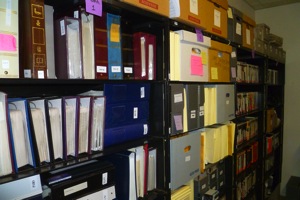
On a recent visit I asked Kelly Revak, chief archivist about Lambda’s most immediate goals, especially now that they have completed the exhausting move from their old, cramped space to their newer one.
“Flickr!” she said. “Send your readers to Flickr!”
So many images are being scanned into Flickr that they need help identifying people in the images. This is the legwork of archiving. One name leads to a story which leads to a new piece of information about the community’s evolution. So, go to Flickr.com/lambdaarchives/sets and see if you recognize any people, places or events. Revak also encourages everyone who would like to get to know more about the archive to turn out for their gala Sept 6. 20 Years at the Table will celebrate San Diego’s openly LGBT elected officials. And, like every not for profit organization they are always happy to have more members and volunteers.
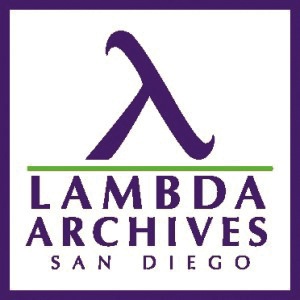
Up front I suggested that every one of us has most likely engaged with the Lambda Archives at one point or another, perhaps without even knowing it. This is because through the years they have hosted a rather large tent at the Pride Festival grounds. I know that I have wandered through many times perusing old artifacts without making a strong connection between the tent, the documents and the local organization.
And now that you know they exist, don’t ever absent mindedly throw your old mementos away. Check with Lambda Archives first because your refuse might just be treasure to them.
619-260-1522, lambdaarchives.org











